Research Proposal: Talent Management and Skill Gaps in Hilton Hotels
VerifiedAdded on 2022/08/23
|13
|4096
|21
Report
AI Summary
This research proposal investigates the impact of skills shortages and skill gaps on employee performance within Hilton Hotels in the UK. It aims to identify key issues related to the lack of skilled labor, explore the impact of underqualified employees, and contribute to existing research by providing recommendations to Hilton hotel management. The proposal outlines the research hypothesis, objectives, and rationale, referencing literature from sources such as Boella and Goss-Turner (2012) and the Department for Education and Employment (2000). The study highlights the current situation of the issue, emphasizing the challenges faced by the UK hotel industry in attracting and retaining skilled employees, and the need for further investigation into the real impact of these shortages. The literature review explores various factors contributing to the problem, including technological advancements, demographic changes, and the importance of human resources management. The research seeks to address the gap in current literature by analyzing the effect of skills shortages on employee career prospects and talent management. The research also aims to provide insights that could assist the researcher in their future goal of becoming a Hotel General Manager.
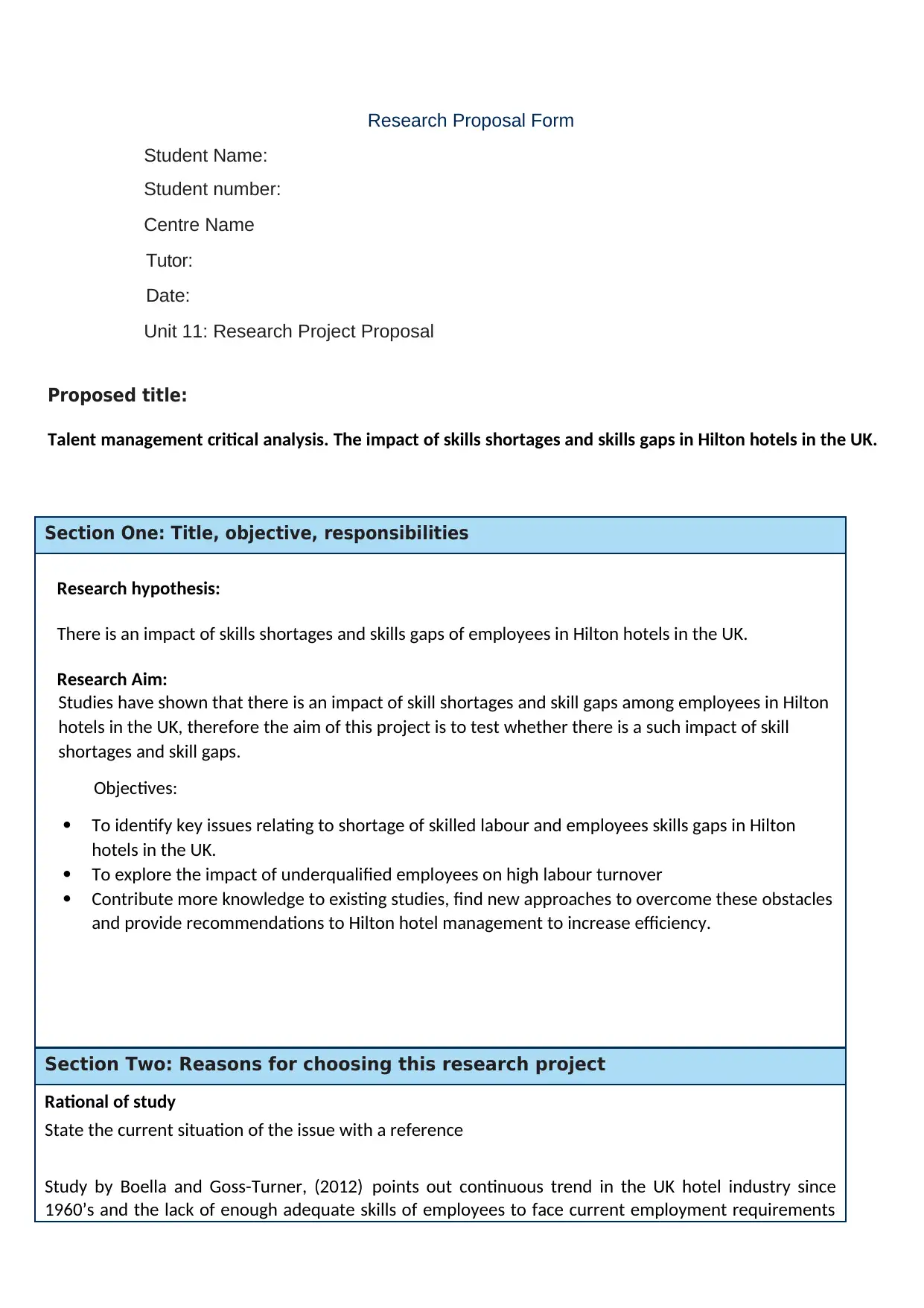
Research Proposal Form
Student Name:
Student number:
Centre Name
Tutor:
Date:
Unit 11: Research Project Proposal
Proposed title:
Talent management critical analysis. The impact of skills shortages and skills gaps in Hilton hotels in the UK.
Section One: Title, objective, responsibilities
Research hypothesis:
There is an impact of skills shortages and skills gaps of employees in Hilton hotels in the UK.
Research Aim:
Studies have shown that there is an impact of skill shortages and skill gaps among employees in Hilton
hotels in the UK, therefore the aim of this project is to test whether there is a such impact of skill
shortages and skill gaps.
Objectives:
To identify key issues relating to shortage of skilled labour and employees skills gaps in Hilton
hotels in the UK.
To explore the impact of underqualified employees on high labour turnover
Contribute more knowledge to existing studies, find new approaches to overcome these obstacles
and provide recommendations to Hilton hotel management to increase efficiency.
Section Two: Reasons for choosing this research project
Rational of study
State the current situation of the issue with a reference
Study by Boella and Goss-Turner, (2012) points out continuous trend in the UK hotel industry since
1960’s and the lack of enough adequate skills of employees to face current employment requirements
Student Name:
Student number:
Centre Name
Tutor:
Date:
Unit 11: Research Project Proposal
Proposed title:
Talent management critical analysis. The impact of skills shortages and skills gaps in Hilton hotels in the UK.
Section One: Title, objective, responsibilities
Research hypothesis:
There is an impact of skills shortages and skills gaps of employees in Hilton hotels in the UK.
Research Aim:
Studies have shown that there is an impact of skill shortages and skill gaps among employees in Hilton
hotels in the UK, therefore the aim of this project is to test whether there is a such impact of skill
shortages and skill gaps.
Objectives:
To identify key issues relating to shortage of skilled labour and employees skills gaps in Hilton
hotels in the UK.
To explore the impact of underqualified employees on high labour turnover
Contribute more knowledge to existing studies, find new approaches to overcome these obstacles
and provide recommendations to Hilton hotel management to increase efficiency.
Section Two: Reasons for choosing this research project
Rational of study
State the current situation of the issue with a reference
Study by Boella and Goss-Turner, (2012) points out continuous trend in the UK hotel industry since
1960’s and the lack of enough adequate skills of employees to face current employment requirements
Paraphrase This Document
Need a fresh take? Get an instant paraphrase of this document with our AI Paraphraser
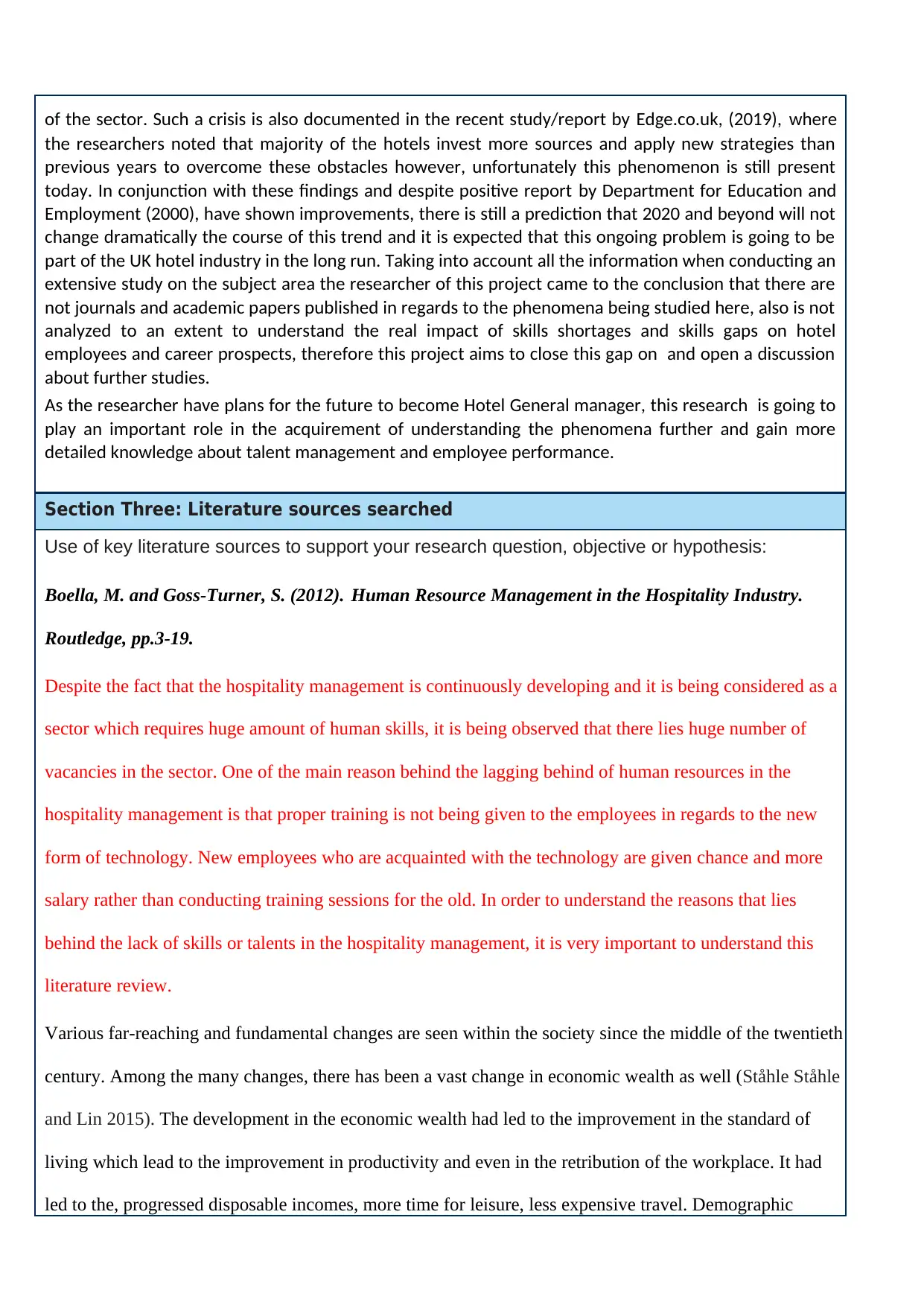
of the sector. Such a crisis is also documented in the recent study/report by Edge.co.uk, (2019), where
the researchers noted that majority of the hotels invest more sources and apply new strategies than
previous years to overcome these obstacles however, unfortunately this phenomenon is still present
today. In conjunction with these findings and despite positive report by Department for Education and
Employment (2000), have shown improvements, there is still a prediction that 2020 and beyond will not
change dramatically the course of this trend and it is expected that this ongoing problem is going to be
part of the UK hotel industry in the long run. Taking into account all the information when conducting an
extensive study on the subject area the researcher of this project came to the conclusion that there are
not journals and academic papers published in regards to the phenomena being studied here, also is not
analyzed to an extent to understand the real impact of skills shortages and skills gaps on hotel
employees and career prospects, therefore this project aims to close this gap on and open a discussion
about further studies.
As the researcher have plans for the future to become Hotel General manager, this research is going to
play an important role in the acquirement of understanding the phenomena further and gain more
detailed knowledge about talent management and employee performance.
Section Three: Literature sources searched
Use of key literature sources to support your research question, objective or hypothesis:
Boella, M. and Goss-Turner, S. (2012). Human Resource Management in the Hospitality Industry.
Routledge, pp.3-19.
Despite the fact that the hospitality management is continuously developing and it is being considered as a
sector which requires huge amount of human skills, it is being observed that there lies huge number of
vacancies in the sector. One of the main reason behind the lagging behind of human resources in the
hospitality management is that proper training is not being given to the employees in regards to the new
form of technology. New employees who are acquainted with the technology are given chance and more
salary rather than conducting training sessions for the old. In order to understand the reasons that lies
behind the lack of skills or talents in the hospitality management, it is very important to understand this
literature review.
Various far-reaching and fundamental changes are seen within the society since the middle of the twentieth
century. Among the many changes, there has been a vast change in economic wealth as well (Ståhle Ståhle
and Lin 2015). The development in the economic wealth had led to the improvement in the standard of
living which lead to the improvement in productivity and even in the retribution of the workplace. It had
led to the, progressed disposable incomes, more time for leisure, less expensive travel. Demographic
the researchers noted that majority of the hotels invest more sources and apply new strategies than
previous years to overcome these obstacles however, unfortunately this phenomenon is still present
today. In conjunction with these findings and despite positive report by Department for Education and
Employment (2000), have shown improvements, there is still a prediction that 2020 and beyond will not
change dramatically the course of this trend and it is expected that this ongoing problem is going to be
part of the UK hotel industry in the long run. Taking into account all the information when conducting an
extensive study on the subject area the researcher of this project came to the conclusion that there are
not journals and academic papers published in regards to the phenomena being studied here, also is not
analyzed to an extent to understand the real impact of skills shortages and skills gaps on hotel
employees and career prospects, therefore this project aims to close this gap on and open a discussion
about further studies.
As the researcher have plans for the future to become Hotel General manager, this research is going to
play an important role in the acquirement of understanding the phenomena further and gain more
detailed knowledge about talent management and employee performance.
Section Three: Literature sources searched
Use of key literature sources to support your research question, objective or hypothesis:
Boella, M. and Goss-Turner, S. (2012). Human Resource Management in the Hospitality Industry.
Routledge, pp.3-19.
Despite the fact that the hospitality management is continuously developing and it is being considered as a
sector which requires huge amount of human skills, it is being observed that there lies huge number of
vacancies in the sector. One of the main reason behind the lagging behind of human resources in the
hospitality management is that proper training is not being given to the employees in regards to the new
form of technology. New employees who are acquainted with the technology are given chance and more
salary rather than conducting training sessions for the old. In order to understand the reasons that lies
behind the lack of skills or talents in the hospitality management, it is very important to understand this
literature review.
Various far-reaching and fundamental changes are seen within the society since the middle of the twentieth
century. Among the many changes, there has been a vast change in economic wealth as well (Ståhle Ståhle
and Lin 2015). The development in the economic wealth had led to the improvement in the standard of
living which lead to the improvement in productivity and even in the retribution of the workplace. It had
led to the, progressed disposable incomes, more time for leisure, less expensive travel. Demographic
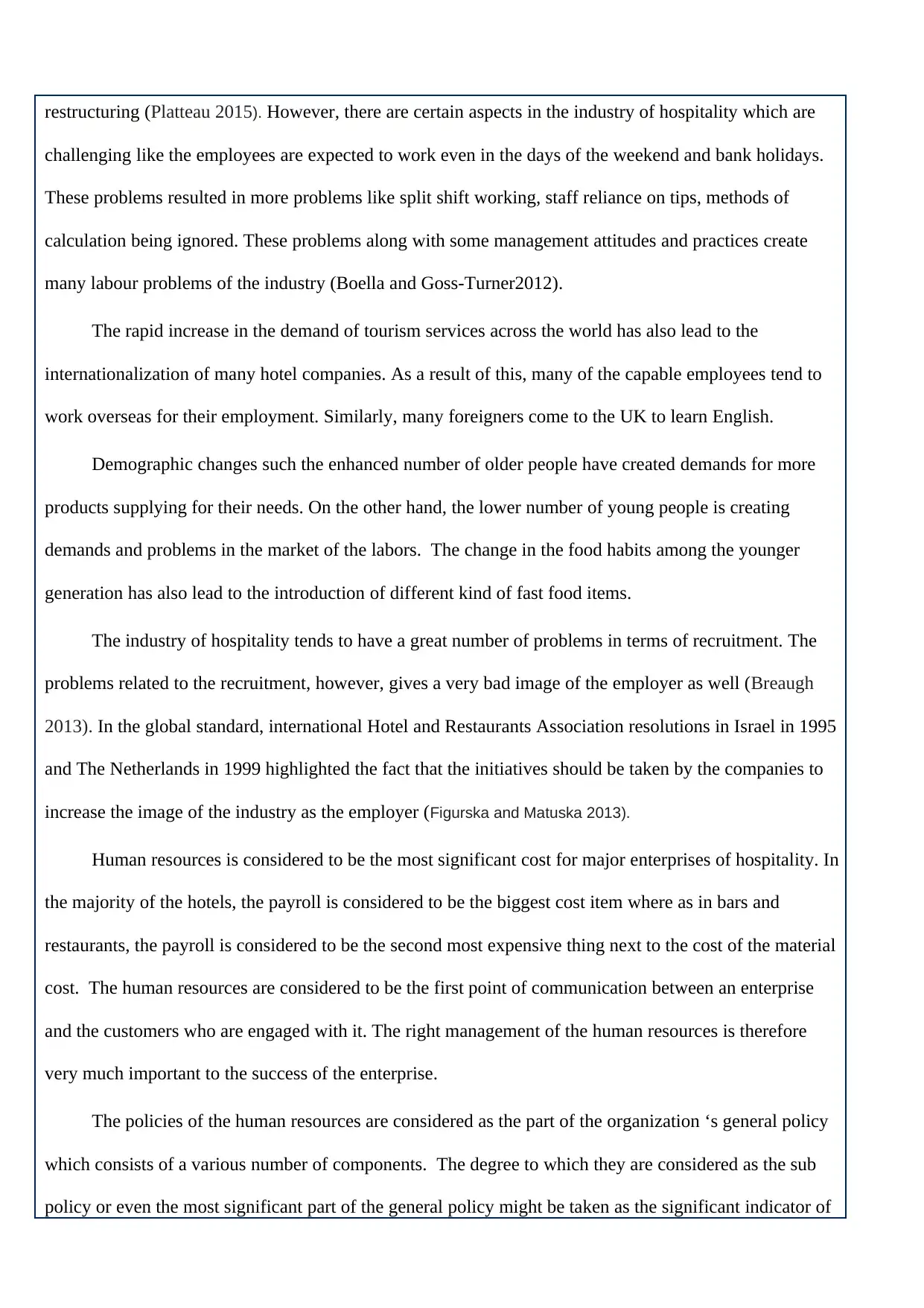
restructuring (Platteau 2015). However, there are certain aspects in the industry of hospitality which are
challenging like the employees are expected to work even in the days of the weekend and bank holidays.
These problems resulted in more problems like split shift working, staff reliance on tips, methods of
calculation being ignored. These problems along with some management attitudes and practices create
many labour problems of the industry (Boella and Goss-Turner2012).
The rapid increase in the demand of tourism services across the world has also lead to the
internationalization of many hotel companies. As a result of this, many of the capable employees tend to
work overseas for their employment. Similarly, many foreigners come to the UK to learn English.
Demographic changes such the enhanced number of older people have created demands for more
products supplying for their needs. On the other hand, the lower number of young people is creating
demands and problems in the market of the labors. The change in the food habits among the younger
generation has also lead to the introduction of different kind of fast food items.
The industry of hospitality tends to have a great number of problems in terms of recruitment. The
problems related to the recruitment, however, gives a very bad image of the employer as well (Breaugh
2013). In the global standard, international Hotel and Restaurants Association resolutions in Israel in 1995
and The Netherlands in 1999 highlighted the fact that the initiatives should be taken by the companies to
increase the image of the industry as the employer (Figurska and Matuska 2013).
Human resources is considered to be the most significant cost for major enterprises of hospitality. In
the majority of the hotels, the payroll is considered to be the biggest cost item where as in bars and
restaurants, the payroll is considered to be the second most expensive thing next to the cost of the material
cost. The human resources are considered to be the first point of communication between an enterprise
and the customers who are engaged with it. The right management of the human resources is therefore
very much important to the success of the enterprise.
The policies of the human resources are considered as the part of the organization ‘s general policy
which consists of a various number of components. The degree to which they are considered as the sub
policy or even the most significant part of the general policy might be taken as the significant indicator of
challenging like the employees are expected to work even in the days of the weekend and bank holidays.
These problems resulted in more problems like split shift working, staff reliance on tips, methods of
calculation being ignored. These problems along with some management attitudes and practices create
many labour problems of the industry (Boella and Goss-Turner2012).
The rapid increase in the demand of tourism services across the world has also lead to the
internationalization of many hotel companies. As a result of this, many of the capable employees tend to
work overseas for their employment. Similarly, many foreigners come to the UK to learn English.
Demographic changes such the enhanced number of older people have created demands for more
products supplying for their needs. On the other hand, the lower number of young people is creating
demands and problems in the market of the labors. The change in the food habits among the younger
generation has also lead to the introduction of different kind of fast food items.
The industry of hospitality tends to have a great number of problems in terms of recruitment. The
problems related to the recruitment, however, gives a very bad image of the employer as well (Breaugh
2013). In the global standard, international Hotel and Restaurants Association resolutions in Israel in 1995
and The Netherlands in 1999 highlighted the fact that the initiatives should be taken by the companies to
increase the image of the industry as the employer (Figurska and Matuska 2013).
Human resources is considered to be the most significant cost for major enterprises of hospitality. In
the majority of the hotels, the payroll is considered to be the biggest cost item where as in bars and
restaurants, the payroll is considered to be the second most expensive thing next to the cost of the material
cost. The human resources are considered to be the first point of communication between an enterprise
and the customers who are engaged with it. The right management of the human resources is therefore
very much important to the success of the enterprise.
The policies of the human resources are considered as the part of the organization ‘s general policy
which consists of a various number of components. The degree to which they are considered as the sub
policy or even the most significant part of the general policy might be taken as the significant indicator of
⊘ This is a preview!⊘
Do you want full access?
Subscribe today to unlock all pages.

Trusted by 1+ million students worldwide
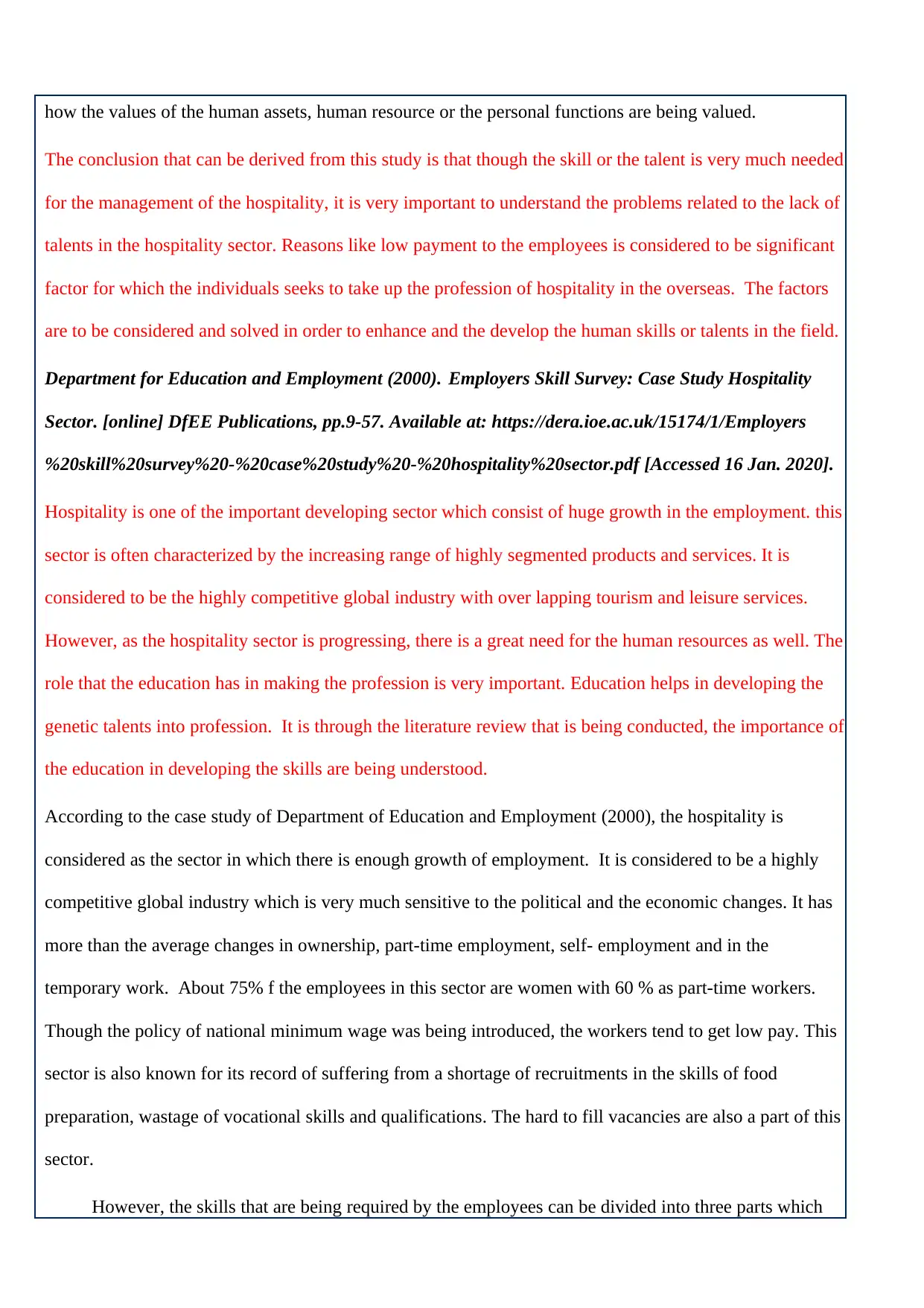
how the values of the human assets, human resource or the personal functions are being valued.
The conclusion that can be derived from this study is that though the skill or the talent is very much needed
for the management of the hospitality, it is very important to understand the problems related to the lack of
talents in the hospitality sector. Reasons like low payment to the employees is considered to be significant
factor for which the individuals seeks to take up the profession of hospitality in the overseas. The factors
are to be considered and solved in order to enhance and the develop the human skills or talents in the field.
Department for Education and Employment (2000). Employers Skill Survey: Case Study Hospitality
Sector. [online] DfEE Publications, pp.9-57. Available at: https://dera.ioe.ac.uk/15174/1/Employers
%20skill%20survey%20-%20case%20study%20-%20hospitality%20sector.pdf [Accessed 16 Jan. 2020].
Hospitality is one of the important developing sector which consist of huge growth in the employment. this
sector is often characterized by the increasing range of highly segmented products and services. It is
considered to be the highly competitive global industry with over lapping tourism and leisure services.
However, as the hospitality sector is progressing, there is a great need for the human resources as well. The
role that the education has in making the profession is very important. Education helps in developing the
genetic talents into profession. It is through the literature review that is being conducted, the importance of
the education in developing the skills are being understood.
According to the case study of Department of Education and Employment (2000), the hospitality is
considered as the sector in which there is enough growth of employment. It is considered to be a highly
competitive global industry which is very much sensitive to the political and the economic changes. It has
more than the average changes in ownership, part-time employment, self- employment and in the
temporary work. About 75% f the employees in this sector are women with 60 % as part-time workers.
Though the policy of national minimum wage was being introduced, the workers tend to get low pay. This
sector is also known for its record of suffering from a shortage of recruitments in the skills of food
preparation, wastage of vocational skills and qualifications. The hard to fill vacancies are also a part of this
sector.
However, the skills that are being required by the employees can be divided into three parts which
The conclusion that can be derived from this study is that though the skill or the talent is very much needed
for the management of the hospitality, it is very important to understand the problems related to the lack of
talents in the hospitality sector. Reasons like low payment to the employees is considered to be significant
factor for which the individuals seeks to take up the profession of hospitality in the overseas. The factors
are to be considered and solved in order to enhance and the develop the human skills or talents in the field.
Department for Education and Employment (2000). Employers Skill Survey: Case Study Hospitality
Sector. [online] DfEE Publications, pp.9-57. Available at: https://dera.ioe.ac.uk/15174/1/Employers
%20skill%20survey%20-%20case%20study%20-%20hospitality%20sector.pdf [Accessed 16 Jan. 2020].
Hospitality is one of the important developing sector which consist of huge growth in the employment. this
sector is often characterized by the increasing range of highly segmented products and services. It is
considered to be the highly competitive global industry with over lapping tourism and leisure services.
However, as the hospitality sector is progressing, there is a great need for the human resources as well. The
role that the education has in making the profession is very important. Education helps in developing the
genetic talents into profession. It is through the literature review that is being conducted, the importance of
the education in developing the skills are being understood.
According to the case study of Department of Education and Employment (2000), the hospitality is
considered as the sector in which there is enough growth of employment. It is considered to be a highly
competitive global industry which is very much sensitive to the political and the economic changes. It has
more than the average changes in ownership, part-time employment, self- employment and in the
temporary work. About 75% f the employees in this sector are women with 60 % as part-time workers.
Though the policy of national minimum wage was being introduced, the workers tend to get low pay. This
sector is also known for its record of suffering from a shortage of recruitments in the skills of food
preparation, wastage of vocational skills and qualifications. The hard to fill vacancies are also a part of this
sector.
However, the skills that are being required by the employees can be divided into three parts which
Paraphrase This Document
Need a fresh take? Get an instant paraphrase of this document with our AI Paraphraser
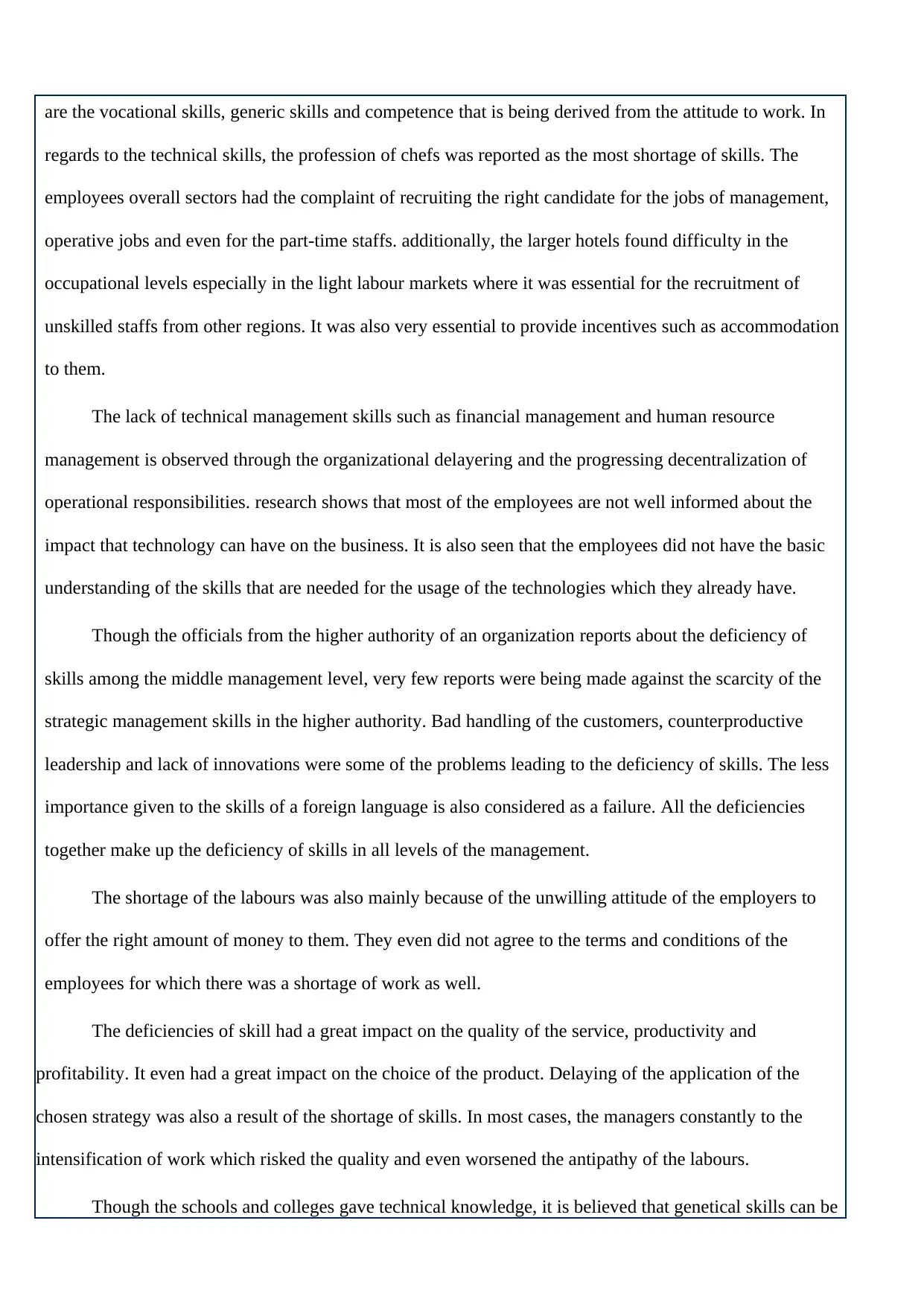
are the vocational skills, generic skills and competence that is being derived from the attitude to work. In
regards to the technical skills, the profession of chefs was reported as the most shortage of skills. The
employees overall sectors had the complaint of recruiting the right candidate for the jobs of management,
operative jobs and even for the part-time staffs. additionally, the larger hotels found difficulty in the
occupational levels especially in the light labour markets where it was essential for the recruitment of
unskilled staffs from other regions. It was also very essential to provide incentives such as accommodation
to them.
The lack of technical management skills such as financial management and human resource
management is observed through the organizational delayering and the progressing decentralization of
operational responsibilities. research shows that most of the employees are not well informed about the
impact that technology can have on the business. It is also seen that the employees did not have the basic
understanding of the skills that are needed for the usage of the technologies which they already have.
Though the officials from the higher authority of an organization reports about the deficiency of
skills among the middle management level, very few reports were being made against the scarcity of the
strategic management skills in the higher authority. Bad handling of the customers, counterproductive
leadership and lack of innovations were some of the problems leading to the deficiency of skills. The less
importance given to the skills of a foreign language is also considered as a failure. All the deficiencies
together make up the deficiency of skills in all levels of the management.
The shortage of the labours was also mainly because of the unwilling attitude of the employers to
offer the right amount of money to them. They even did not agree to the terms and conditions of the
employees for which there was a shortage of work as well.
The deficiencies of skill had a great impact on the quality of the service, productivity and
profitability. It even had a great impact on the choice of the product. Delaying of the application of the
chosen strategy was also a result of the shortage of skills. In most cases, the managers constantly to the
intensification of work which risked the quality and even worsened the antipathy of the labours.
Though the schools and colleges gave technical knowledge, it is believed that genetical skills can be
regards to the technical skills, the profession of chefs was reported as the most shortage of skills. The
employees overall sectors had the complaint of recruiting the right candidate for the jobs of management,
operative jobs and even for the part-time staffs. additionally, the larger hotels found difficulty in the
occupational levels especially in the light labour markets where it was essential for the recruitment of
unskilled staffs from other regions. It was also very essential to provide incentives such as accommodation
to them.
The lack of technical management skills such as financial management and human resource
management is observed through the organizational delayering and the progressing decentralization of
operational responsibilities. research shows that most of the employees are not well informed about the
impact that technology can have on the business. It is also seen that the employees did not have the basic
understanding of the skills that are needed for the usage of the technologies which they already have.
Though the officials from the higher authority of an organization reports about the deficiency of
skills among the middle management level, very few reports were being made against the scarcity of the
strategic management skills in the higher authority. Bad handling of the customers, counterproductive
leadership and lack of innovations were some of the problems leading to the deficiency of skills. The less
importance given to the skills of a foreign language is also considered as a failure. All the deficiencies
together make up the deficiency of skills in all levels of the management.
The shortage of the labours was also mainly because of the unwilling attitude of the employers to
offer the right amount of money to them. They even did not agree to the terms and conditions of the
employees for which there was a shortage of work as well.
The deficiencies of skill had a great impact on the quality of the service, productivity and
profitability. It even had a great impact on the choice of the product. Delaying of the application of the
chosen strategy was also a result of the shortage of skills. In most cases, the managers constantly to the
intensification of work which risked the quality and even worsened the antipathy of the labours.
Though the schools and colleges gave technical knowledge, it is believed that genetical skills can be
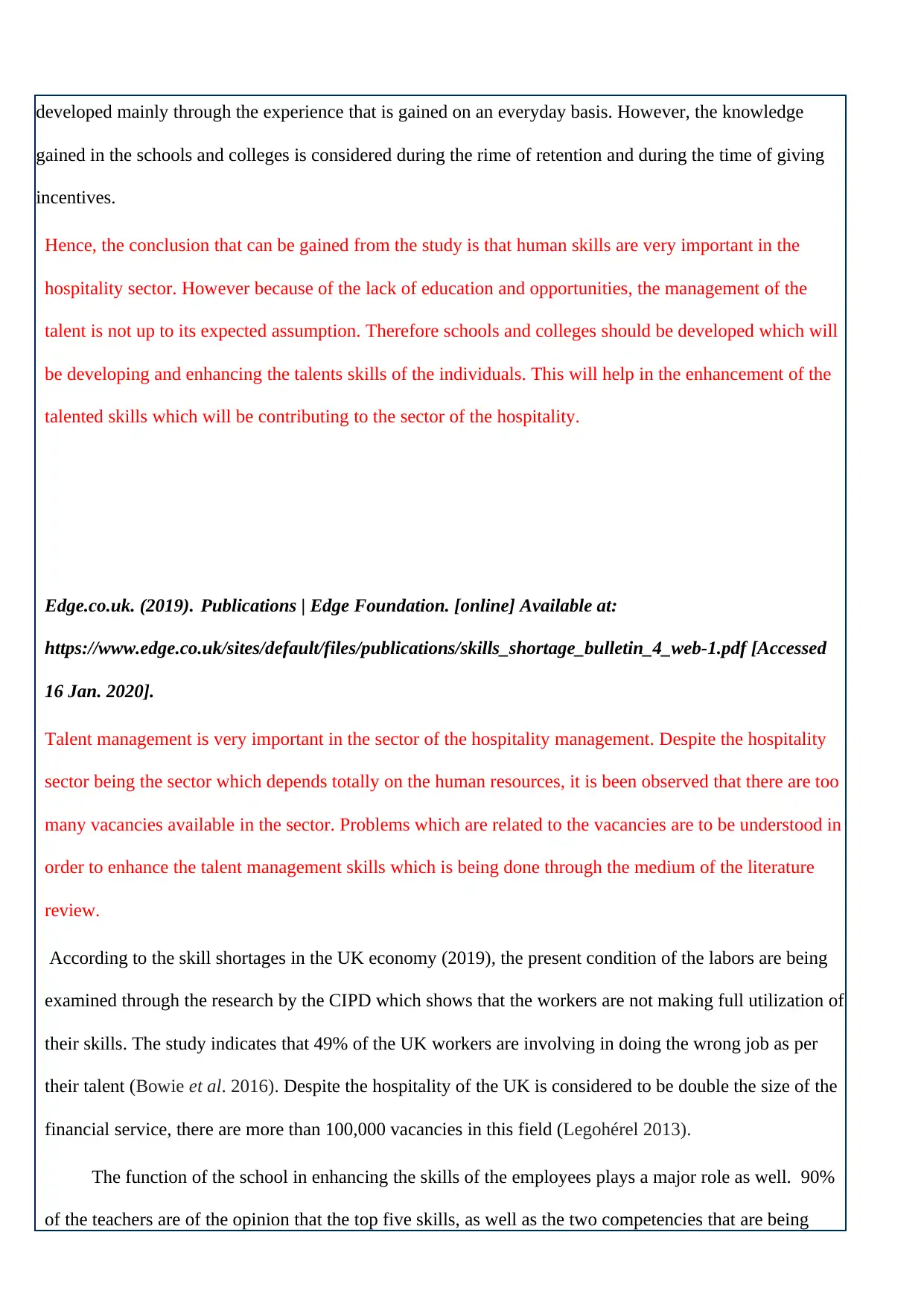
developed mainly through the experience that is gained on an everyday basis. However, the knowledge
gained in the schools and colleges is considered during the rime of retention and during the time of giving
incentives.
Hence, the conclusion that can be gained from the study is that human skills are very important in the
hospitality sector. However because of the lack of education and opportunities, the management of the
talent is not up to its expected assumption. Therefore schools and colleges should be developed which will
be developing and enhancing the talents skills of the individuals. This will help in the enhancement of the
talented skills which will be contributing to the sector of the hospitality.
Edge.co.uk. (2019). Publications | Edge Foundation. [online] Available at:
https://www.edge.co.uk/sites/default/files/publications/skills_shortage_bulletin_4_web-1.pdf [Accessed
16 Jan. 2020].
Talent management is very important in the sector of the hospitality management. Despite the hospitality
sector being the sector which depends totally on the human resources, it is been observed that there are too
many vacancies available in the sector. Problems which are related to the vacancies are to be understood in
order to enhance the talent management skills which is being done through the medium of the literature
review.
According to the skill shortages in the UK economy (2019), the present condition of the labors are being
examined through the research by the CIPD which shows that the workers are not making full utilization of
their skills. The study indicates that 49% of the UK workers are involving in doing the wrong job as per
their talent (Bowie et al. 2016). Despite the hospitality of the UK is considered to be double the size of the
financial service, there are more than 100,000 vacancies in this field (Legohérel 2013).
The function of the school in enhancing the skills of the employees plays a major role as well. 90%
of the teachers are of the opinion that the top five skills, as well as the two competencies that are being
gained in the schools and colleges is considered during the rime of retention and during the time of giving
incentives.
Hence, the conclusion that can be gained from the study is that human skills are very important in the
hospitality sector. However because of the lack of education and opportunities, the management of the
talent is not up to its expected assumption. Therefore schools and colleges should be developed which will
be developing and enhancing the talents skills of the individuals. This will help in the enhancement of the
talented skills which will be contributing to the sector of the hospitality.
Edge.co.uk. (2019). Publications | Edge Foundation. [online] Available at:
https://www.edge.co.uk/sites/default/files/publications/skills_shortage_bulletin_4_web-1.pdf [Accessed
16 Jan. 2020].
Talent management is very important in the sector of the hospitality management. Despite the hospitality
sector being the sector which depends totally on the human resources, it is been observed that there are too
many vacancies available in the sector. Problems which are related to the vacancies are to be understood in
order to enhance the talent management skills which is being done through the medium of the literature
review.
According to the skill shortages in the UK economy (2019), the present condition of the labors are being
examined through the research by the CIPD which shows that the workers are not making full utilization of
their skills. The study indicates that 49% of the UK workers are involving in doing the wrong job as per
their talent (Bowie et al. 2016). Despite the hospitality of the UK is considered to be double the size of the
financial service, there are more than 100,000 vacancies in this field (Legohérel 2013).
The function of the school in enhancing the skills of the employees plays a major role as well. 90%
of the teachers are of the opinion that the top five skills, as well as the two competencies that are being
⊘ This is a preview!⊘
Do you want full access?
Subscribe today to unlock all pages.

Trusted by 1+ million students worldwide
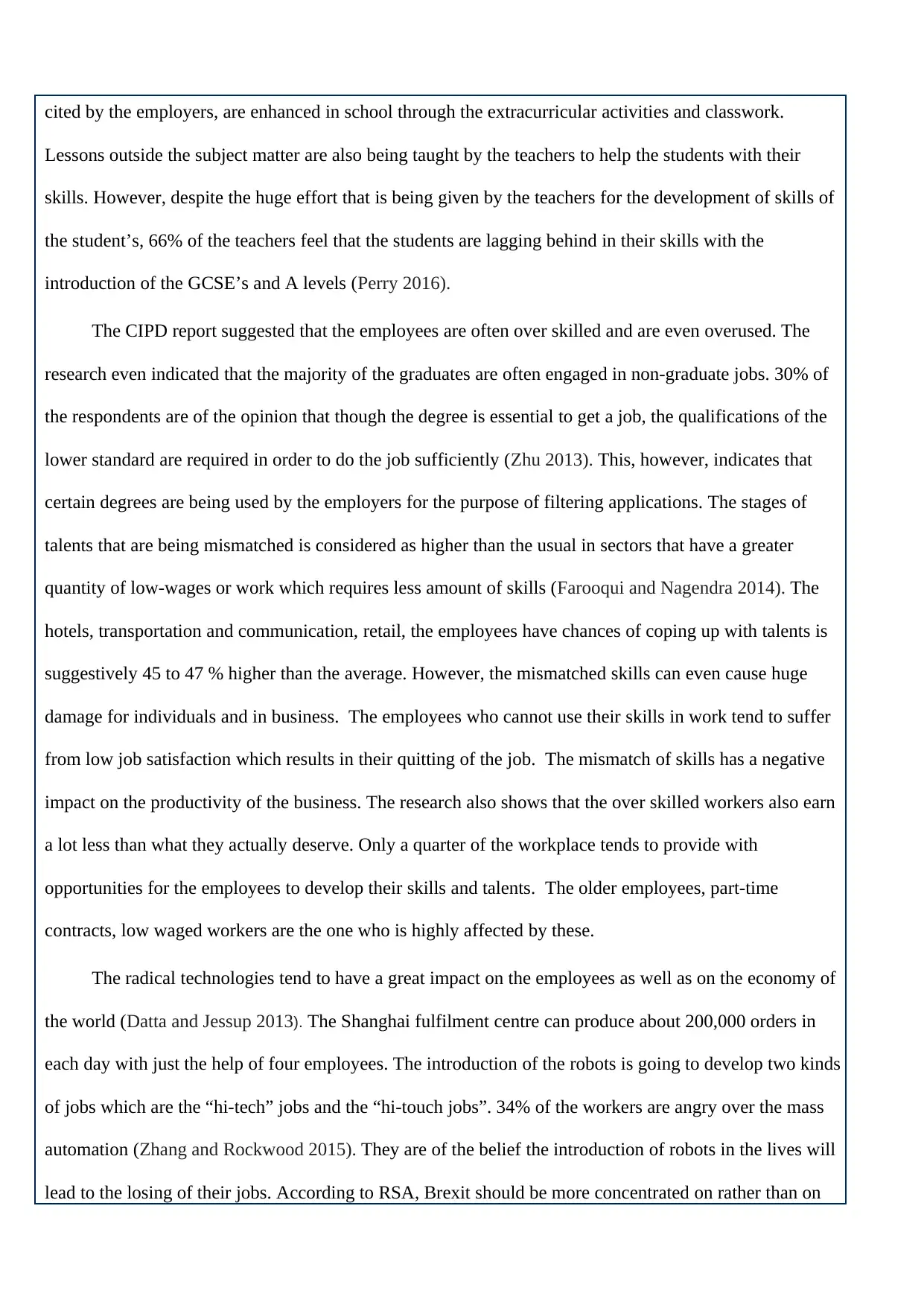
cited by the employers, are enhanced in school through the extracurricular activities and classwork.
Lessons outside the subject matter are also being taught by the teachers to help the students with their
skills. However, despite the huge effort that is being given by the teachers for the development of skills of
the student’s, 66% of the teachers feel that the students are lagging behind in their skills with the
introduction of the GCSE’s and A levels (Perry 2016).
The CIPD report suggested that the employees are often over skilled and are even overused. The
research even indicated that the majority of the graduates are often engaged in non-graduate jobs. 30% of
the respondents are of the opinion that though the degree is essential to get a job, the qualifications of the
lower standard are required in order to do the job sufficiently (Zhu 2013). This, however, indicates that
certain degrees are being used by the employers for the purpose of filtering applications. The stages of
talents that are being mismatched is considered as higher than the usual in sectors that have a greater
quantity of low-wages or work which requires less amount of skills (Farooqui and Nagendra 2014). The
hotels, transportation and communication, retail, the employees have chances of coping up with talents is
suggestively 45 to 47 % higher than the average. However, the mismatched skills can even cause huge
damage for individuals and in business. The employees who cannot use their skills in work tend to suffer
from low job satisfaction which results in their quitting of the job. The mismatch of skills has a negative
impact on the productivity of the business. The research also shows that the over skilled workers also earn
a lot less than what they actually deserve. Only a quarter of the workplace tends to provide with
opportunities for the employees to develop their skills and talents. The older employees, part-time
contracts, low waged workers are the one who is highly affected by these.
The radical technologies tend to have a great impact on the employees as well as on the economy of
the world (Datta and Jessup 2013). The Shanghai fulfilment centre can produce about 200,000 orders in
each day with just the help of four employees. The introduction of the robots is going to develop two kinds
of jobs which are the “hi-tech” jobs and the “hi-touch jobs”. 34% of the workers are angry over the mass
automation (Zhang and Rockwood 2015). They are of the belief the introduction of robots in the lives will
lead to the losing of their jobs. According to RSA, Brexit should be more concentrated on rather than on
Lessons outside the subject matter are also being taught by the teachers to help the students with their
skills. However, despite the huge effort that is being given by the teachers for the development of skills of
the student’s, 66% of the teachers feel that the students are lagging behind in their skills with the
introduction of the GCSE’s and A levels (Perry 2016).
The CIPD report suggested that the employees are often over skilled and are even overused. The
research even indicated that the majority of the graduates are often engaged in non-graduate jobs. 30% of
the respondents are of the opinion that though the degree is essential to get a job, the qualifications of the
lower standard are required in order to do the job sufficiently (Zhu 2013). This, however, indicates that
certain degrees are being used by the employers for the purpose of filtering applications. The stages of
talents that are being mismatched is considered as higher than the usual in sectors that have a greater
quantity of low-wages or work which requires less amount of skills (Farooqui and Nagendra 2014). The
hotels, transportation and communication, retail, the employees have chances of coping up with talents is
suggestively 45 to 47 % higher than the average. However, the mismatched skills can even cause huge
damage for individuals and in business. The employees who cannot use their skills in work tend to suffer
from low job satisfaction which results in their quitting of the job. The mismatch of skills has a negative
impact on the productivity of the business. The research also shows that the over skilled workers also earn
a lot less than what they actually deserve. Only a quarter of the workplace tends to provide with
opportunities for the employees to develop their skills and talents. The older employees, part-time
contracts, low waged workers are the one who is highly affected by these.
The radical technologies tend to have a great impact on the employees as well as on the economy of
the world (Datta and Jessup 2013). The Shanghai fulfilment centre can produce about 200,000 orders in
each day with just the help of four employees. The introduction of the robots is going to develop two kinds
of jobs which are the “hi-tech” jobs and the “hi-touch jobs”. 34% of the workers are angry over the mass
automation (Zhang and Rockwood 2015). They are of the belief the introduction of robots in the lives will
lead to the losing of their jobs. According to RSA, Brexit should be more concentrated on rather than on
Paraphrase This Document
Need a fresh take? Get an instant paraphrase of this document with our AI Paraphraser
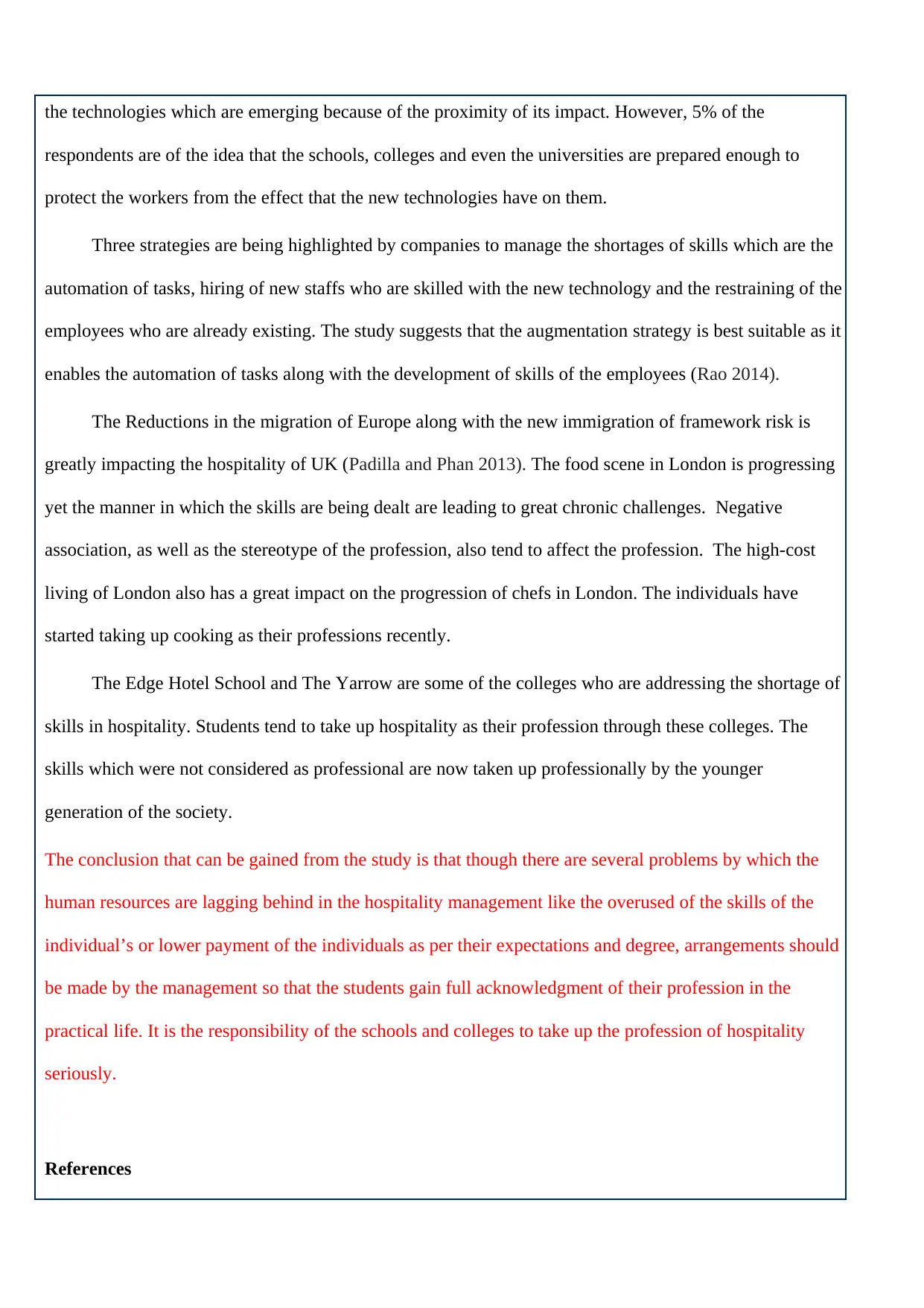
the technologies which are emerging because of the proximity of its impact. However, 5% of the
respondents are of the idea that the schools, colleges and even the universities are prepared enough to
protect the workers from the effect that the new technologies have on them.
Three strategies are being highlighted by companies to manage the shortages of skills which are the
automation of tasks, hiring of new staffs who are skilled with the new technology and the restraining of the
employees who are already existing. The study suggests that the augmentation strategy is best suitable as it
enables the automation of tasks along with the development of skills of the employees (Rao 2014).
The Reductions in the migration of Europe along with the new immigration of framework risk is
greatly impacting the hospitality of UK (Padilla and Phan 2013). The food scene in London is progressing
yet the manner in which the skills are being dealt are leading to great chronic challenges. Negative
association, as well as the stereotype of the profession, also tend to affect the profession. The high-cost
living of London also has a great impact on the progression of chefs in London. The individuals have
started taking up cooking as their professions recently.
The Edge Hotel School and The Yarrow are some of the colleges who are addressing the shortage of
skills in hospitality. Students tend to take up hospitality as their profession through these colleges. The
skills which were not considered as professional are now taken up professionally by the younger
generation of the society.
The conclusion that can be gained from the study is that though there are several problems by which the
human resources are lagging behind in the hospitality management like the overused of the skills of the
individual’s or lower payment of the individuals as per their expectations and degree, arrangements should
be made by the management so that the students gain full acknowledgment of their profession in the
practical life. It is the responsibility of the schools and colleges to take up the profession of hospitality
seriously.
References
respondents are of the idea that the schools, colleges and even the universities are prepared enough to
protect the workers from the effect that the new technologies have on them.
Three strategies are being highlighted by companies to manage the shortages of skills which are the
automation of tasks, hiring of new staffs who are skilled with the new technology and the restraining of the
employees who are already existing. The study suggests that the augmentation strategy is best suitable as it
enables the automation of tasks along with the development of skills of the employees (Rao 2014).
The Reductions in the migration of Europe along with the new immigration of framework risk is
greatly impacting the hospitality of UK (Padilla and Phan 2013). The food scene in London is progressing
yet the manner in which the skills are being dealt are leading to great chronic challenges. Negative
association, as well as the stereotype of the profession, also tend to affect the profession. The high-cost
living of London also has a great impact on the progression of chefs in London. The individuals have
started taking up cooking as their professions recently.
The Edge Hotel School and The Yarrow are some of the colleges who are addressing the shortage of
skills in hospitality. Students tend to take up hospitality as their profession through these colleges. The
skills which were not considered as professional are now taken up professionally by the younger
generation of the society.
The conclusion that can be gained from the study is that though there are several problems by which the
human resources are lagging behind in the hospitality management like the overused of the skills of the
individual’s or lower payment of the individuals as per their expectations and degree, arrangements should
be made by the management so that the students gain full acknowledgment of their profession in the
practical life. It is the responsibility of the schools and colleges to take up the profession of hospitality
seriously.
References
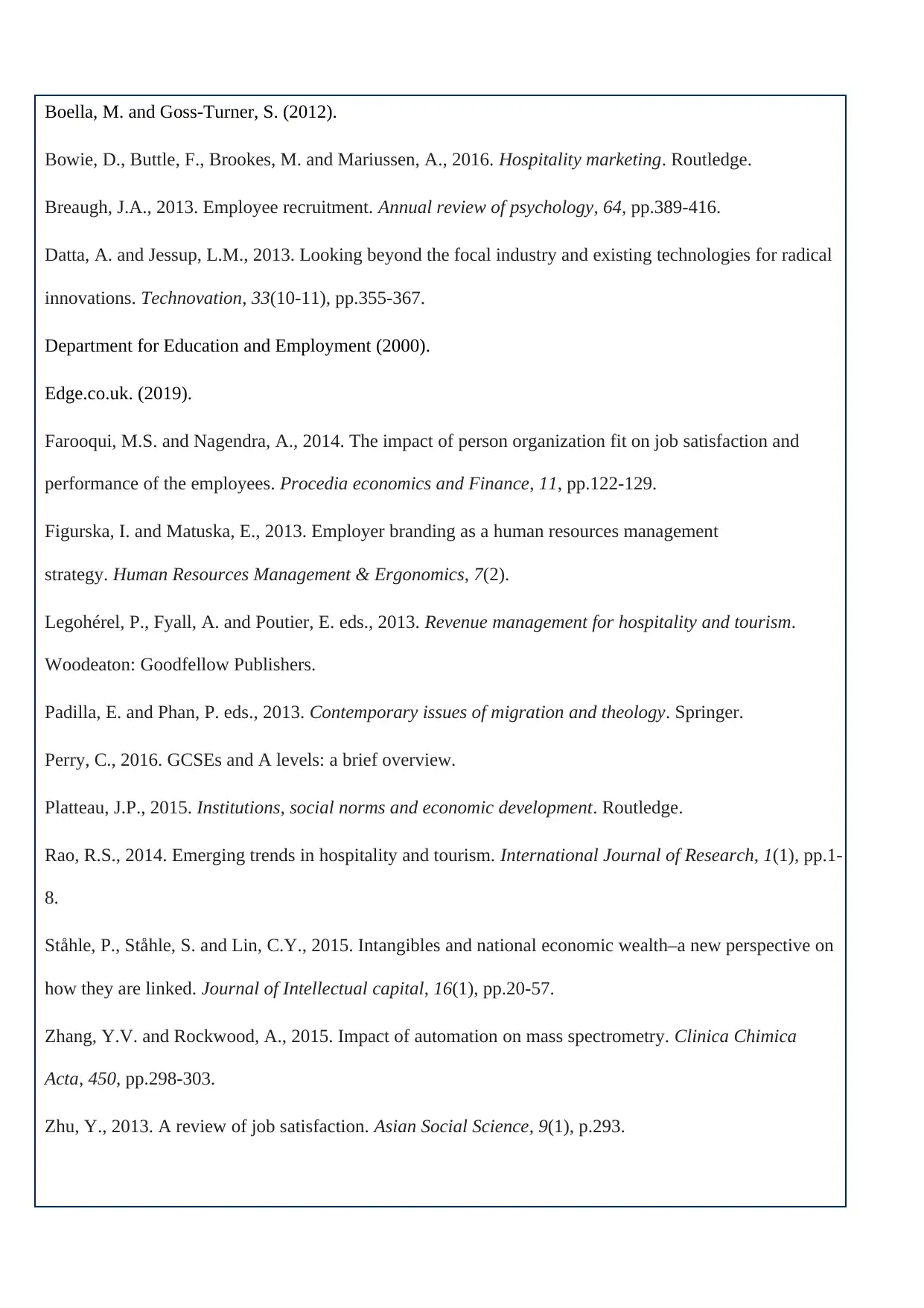
Boella, M. and Goss-Turner, S. (2012).
Bowie, D., Buttle, F., Brookes, M. and Mariussen, A., 2016. Hospitality marketing. Routledge.
Breaugh, J.A., 2013. Employee recruitment. Annual review of psychology, 64, pp.389-416.
Datta, A. and Jessup, L.M., 2013. Looking beyond the focal industry and existing technologies for radical
innovations. Technovation, 33(10-11), pp.355-367.
Department for Education and Employment (2000).
Edge.co.uk. (2019).
Farooqui, M.S. and Nagendra, A., 2014. The impact of person organization fit on job satisfaction and
performance of the employees. Procedia economics and Finance, 11, pp.122-129.
Figurska, I. and Matuska, E., 2013. Employer branding as a human resources management
strategy. Human Resources Management & Ergonomics, 7(2).
Legohérel, P., Fyall, A. and Poutier, E. eds., 2013. Revenue management for hospitality and tourism.
Woodeaton: Goodfellow Publishers.
Padilla, E. and Phan, P. eds., 2013. Contemporary issues of migration and theology. Springer.
Perry, C., 2016. GCSEs and A levels: a brief overview.
Platteau, J.P., 2015. Institutions, social norms and economic development. Routledge.
Rao, R.S., 2014. Emerging trends in hospitality and tourism. International Journal of Research, 1(1), pp.1-
8.
Ståhle, P., Ståhle, S. and Lin, C.Y., 2015. Intangibles and national economic wealth–a new perspective on
how they are linked. Journal of Intellectual capital, 16(1), pp.20-57.
Zhang, Y.V. and Rockwood, A., 2015. Impact of automation on mass spectrometry. Clinica Chimica
Acta, 450, pp.298-303.
Zhu, Y., 2013. A review of job satisfaction. Asian Social Science, 9(1), p.293.
Bowie, D., Buttle, F., Brookes, M. and Mariussen, A., 2016. Hospitality marketing. Routledge.
Breaugh, J.A., 2013. Employee recruitment. Annual review of psychology, 64, pp.389-416.
Datta, A. and Jessup, L.M., 2013. Looking beyond the focal industry and existing technologies for radical
innovations. Technovation, 33(10-11), pp.355-367.
Department for Education and Employment (2000).
Edge.co.uk. (2019).
Farooqui, M.S. and Nagendra, A., 2014. The impact of person organization fit on job satisfaction and
performance of the employees. Procedia economics and Finance, 11, pp.122-129.
Figurska, I. and Matuska, E., 2013. Employer branding as a human resources management
strategy. Human Resources Management & Ergonomics, 7(2).
Legohérel, P., Fyall, A. and Poutier, E. eds., 2013. Revenue management for hospitality and tourism.
Woodeaton: Goodfellow Publishers.
Padilla, E. and Phan, P. eds., 2013. Contemporary issues of migration and theology. Springer.
Perry, C., 2016. GCSEs and A levels: a brief overview.
Platteau, J.P., 2015. Institutions, social norms and economic development. Routledge.
Rao, R.S., 2014. Emerging trends in hospitality and tourism. International Journal of Research, 1(1), pp.1-
8.
Ståhle, P., Ståhle, S. and Lin, C.Y., 2015. Intangibles and national economic wealth–a new perspective on
how they are linked. Journal of Intellectual capital, 16(1), pp.20-57.
Zhang, Y.V. and Rockwood, A., 2015. Impact of automation on mass spectrometry. Clinica Chimica
Acta, 450, pp.298-303.
Zhu, Y., 2013. A review of job satisfaction. Asian Social Science, 9(1), p.293.
⊘ This is a preview!⊘
Do you want full access?
Subscribe today to unlock all pages.

Trusted by 1+ million students worldwide
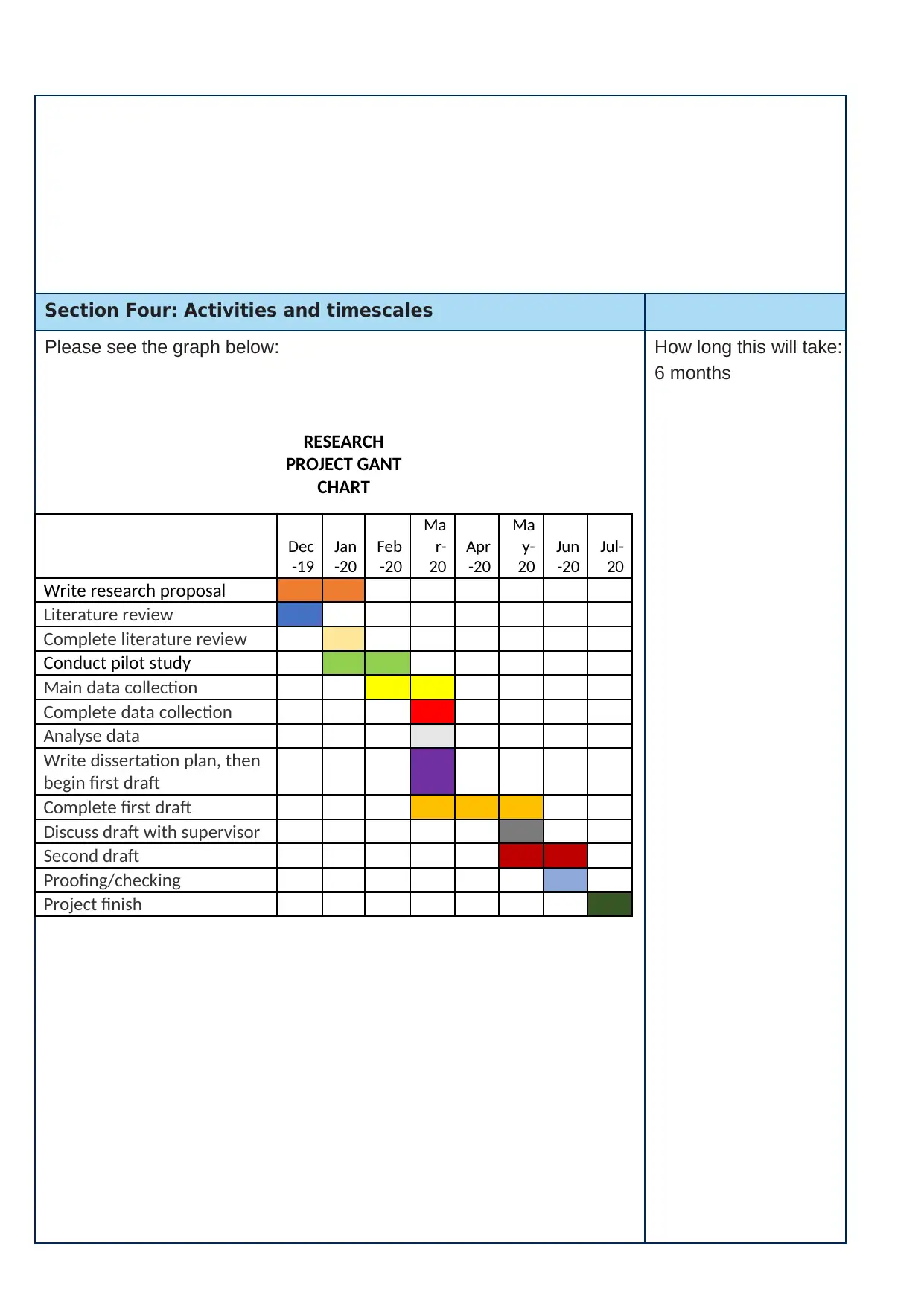
Section Four: Activities and timescales
Please see the graph below: How long this will take:
6 months
RESEARCH
PROJECT GANT
CHART
Dec
-19
Jan
-20
Feb
-20
Ma
r-
20
Apr
-20
Ma
y-
20
Jun
-20
Jul-
20
Write research proposal
Literature review
Complete literature review
Conduct pilot study
Main data collection
Complete data collection
Analyse data
Write dissertation plan, then
begin first draft
Complete first draft
Discuss draft with supervisor
Second draft
Proofing/checking
Project finish
Please see the graph below: How long this will take:
6 months
RESEARCH
PROJECT GANT
CHART
Dec
-19
Jan
-20
Feb
-20
Ma
r-
20
Apr
-20
Ma
y-
20
Jun
-20
Jul-
20
Write research proposal
Literature review
Complete literature review
Conduct pilot study
Main data collection
Complete data collection
Analyse data
Write dissertation plan, then
begin first draft
Complete first draft
Discuss draft with supervisor
Second draft
Proofing/checking
Project finish
Paraphrase This Document
Need a fresh take? Get an instant paraphrase of this document with our AI Paraphraser
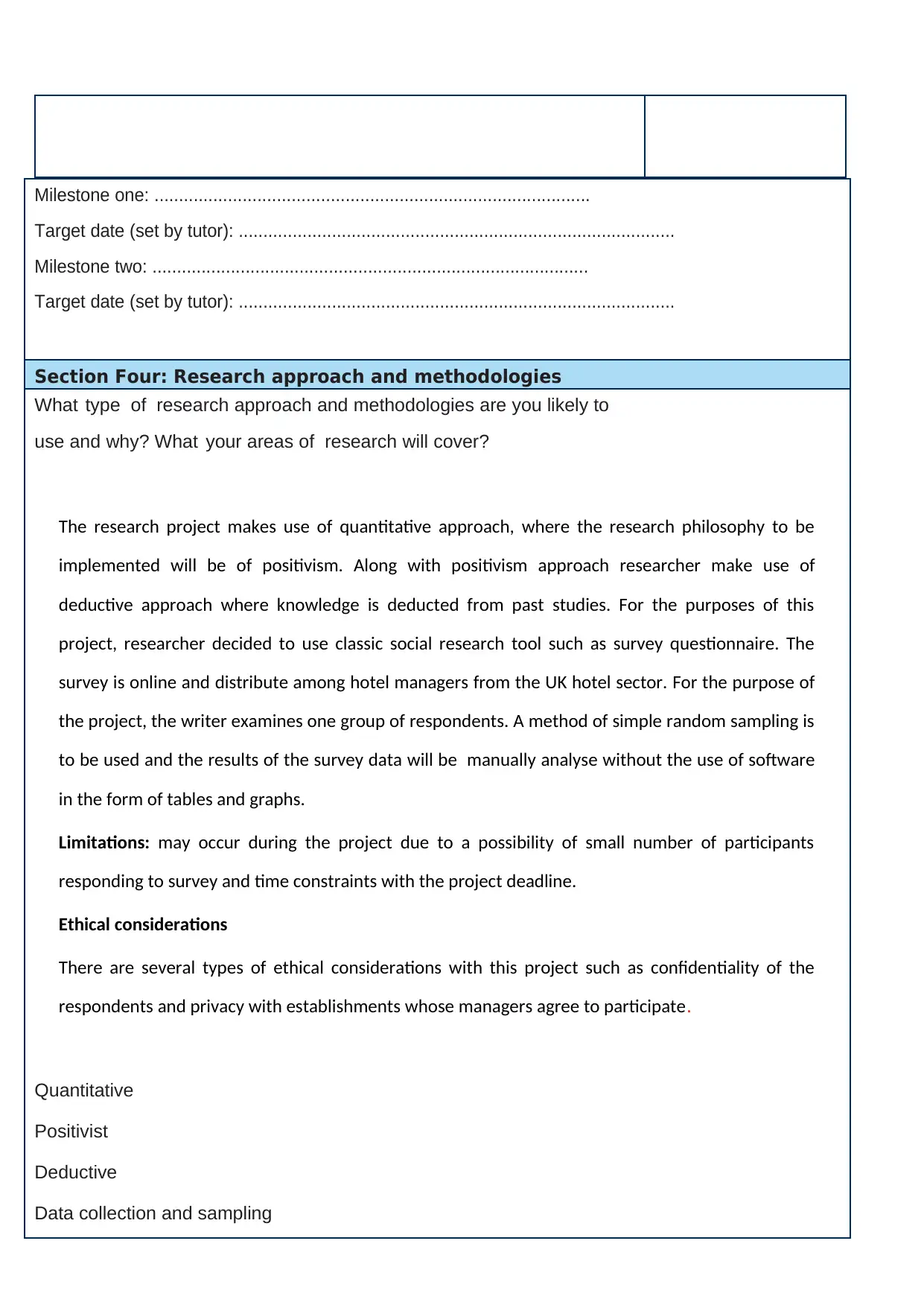
Milestone one: .........................................................................................
Target date (set by tutor): .........................................................................................
Milestone two: .........................................................................................
Target date (set by tutor): .........................................................................................
Section Four: Research approach and methodologies
What type of research approach and methodologies are you likely to
use and why? What your areas of research will cover?
The research project makes use of quantitative approach, where the research philosophy to be
implemented will be of positivism. Along with positivism approach researcher make use of
deductive approach where knowledge is deducted from past studies. For the purposes of this
project, researcher decided to use classic social research tool such as survey questionnaire. The
survey is online and distribute among hotel managers from the UK hotel sector. For the purpose of
the project, the writer examines one group of respondents. A method of simple random sampling is
to be used and the results of the survey data will be manually analyse without the use of software
in the form of tables and graphs.
Limitations: may occur during the project due to a possibility of small number of participants
responding to survey and time constraints with the project deadline.
Ethical considerations
There are several types of ethical considerations with this project such as confidentiality of the
respondents and privacy with establishments whose managers agree to participate.
Quantitative
Positivist
Deductive
Data collection and sampling
Target date (set by tutor): .........................................................................................
Milestone two: .........................................................................................
Target date (set by tutor): .........................................................................................
Section Four: Research approach and methodologies
What type of research approach and methodologies are you likely to
use and why? What your areas of research will cover?
The research project makes use of quantitative approach, where the research philosophy to be
implemented will be of positivism. Along with positivism approach researcher make use of
deductive approach where knowledge is deducted from past studies. For the purposes of this
project, researcher decided to use classic social research tool such as survey questionnaire. The
survey is online and distribute among hotel managers from the UK hotel sector. For the purpose of
the project, the writer examines one group of respondents. A method of simple random sampling is
to be used and the results of the survey data will be manually analyse without the use of software
in the form of tables and graphs.
Limitations: may occur during the project due to a possibility of small number of participants
responding to survey and time constraints with the project deadline.
Ethical considerations
There are several types of ethical considerations with this project such as confidentiality of the
respondents and privacy with establishments whose managers agree to participate.
Quantitative
Positivist
Deductive
Data collection and sampling
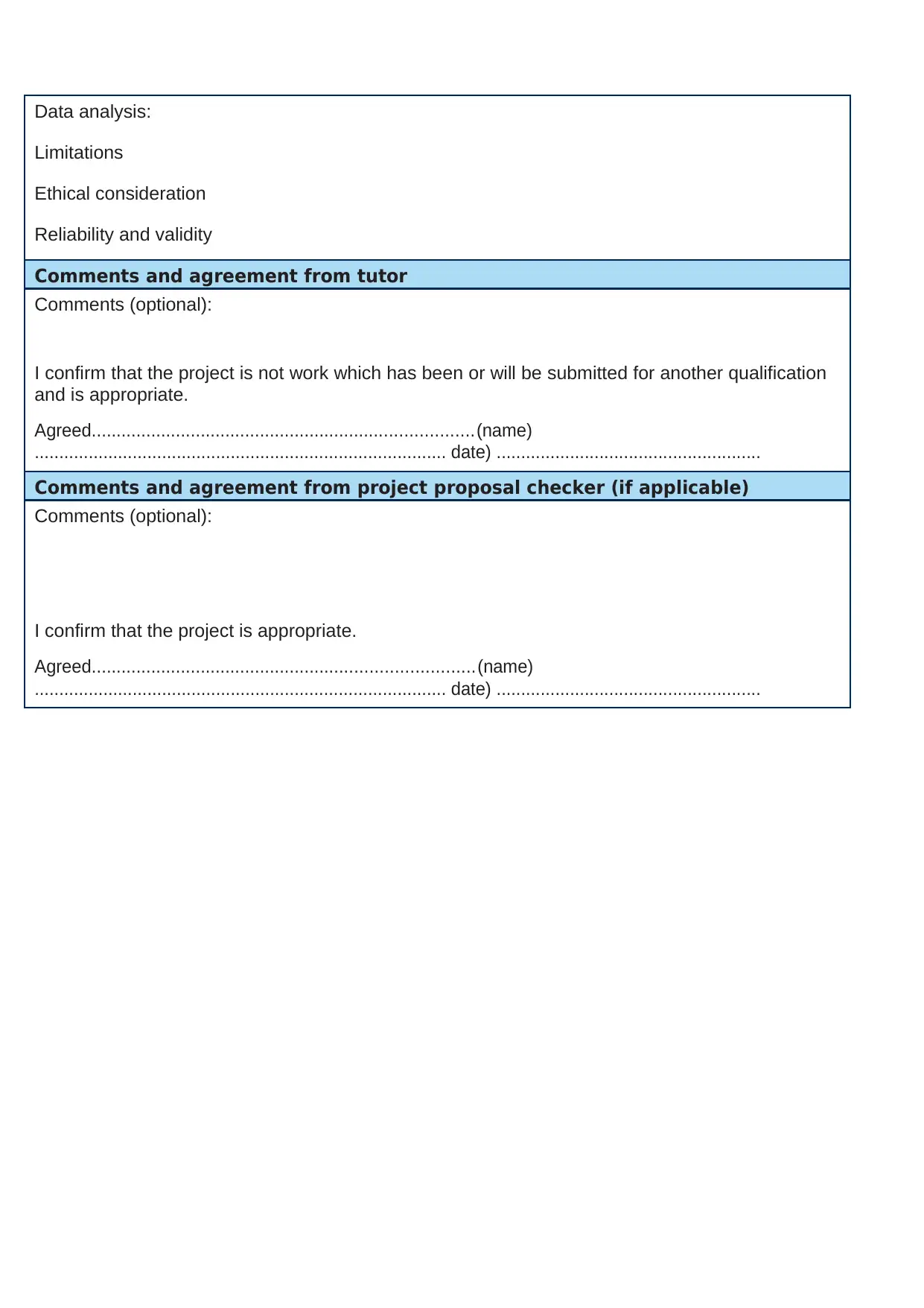
Data analysis:
Limitations
Ethical consideration
Reliability and validity
Comments and agreement from tutor
Comments (optional):
I confirm that the project is not work which has been or will be submitted for another qualification
and is appropriate.
Agreed.............................................................................(name)
.................................................................................... date) ......................................................
Comments and agreement from project proposal checker (if applicable)
Comments (optional):
I confirm that the project is appropriate.
Agreed.............................................................................(name)
.................................................................................... date) ......................................................
Limitations
Ethical consideration
Reliability and validity
Comments and agreement from tutor
Comments (optional):
I confirm that the project is not work which has been or will be submitted for another qualification
and is appropriate.
Agreed.............................................................................(name)
.................................................................................... date) ......................................................
Comments and agreement from project proposal checker (if applicable)
Comments (optional):
I confirm that the project is appropriate.
Agreed.............................................................................(name)
.................................................................................... date) ......................................................
⊘ This is a preview!⊘
Do you want full access?
Subscribe today to unlock all pages.

Trusted by 1+ million students worldwide
1 out of 13
Related Documents
Your All-in-One AI-Powered Toolkit for Academic Success.
+13062052269
info@desklib.com
Available 24*7 on WhatsApp / Email
![[object Object]](/_next/static/media/star-bottom.7253800d.svg)
Unlock your academic potential
Copyright © 2020–2025 A2Z Services. All Rights Reserved. Developed and managed by ZUCOL.





